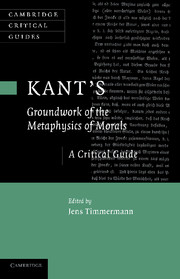Book contents
- Frontmatter
- Contents
- List of contributors
- List of translations and abbreviations
- Introduction
- 1 Ethics and anthropology in the development of Kant's moral philosophy
- 2 Happiness in the Groundwork
- 3 Acting from duty: inclination, reason and moral worth
- 4 Making the law visible: the role of examples in Kant's ethics
- 5 The moral law as causal law
- 6 Dignity and the formula of humanity
- 7 Kant's kingdom of ends: metaphysical, not political
- 8 Kant against the ‘spurious principles of morality’
- 9 Autonomy and impartiality: Groundwork III
- 10 Problems with freedom: Kant's argument in Groundwork III and its subsequent emendations
- 11 Freedom and reason in Groundwork III
- Bibliography
- Index
8 - Kant against the ‘spurious principles of morality’
Published online by Cambridge University Press: 04 August 2010
- Frontmatter
- Contents
- List of contributors
- List of translations and abbreviations
- Introduction
- 1 Ethics and anthropology in the development of Kant's moral philosophy
- 2 Happiness in the Groundwork
- 3 Acting from duty: inclination, reason and moral worth
- 4 Making the law visible: the role of examples in Kant's ethics
- 5 The moral law as causal law
- 6 Dignity and the formula of humanity
- 7 Kant's kingdom of ends: metaphysical, not political
- 8 Kant against the ‘spurious principles of morality’
- 9 Autonomy and impartiality: Groundwork III
- 10 Problems with freedom: Kant's argument in Groundwork III and its subsequent emendations
- 11 Freedom and reason in Groundwork III
- Bibliography
- Index
Summary
Philosophers have to think that their predecessors and contemporaries got things wrong. Otherwise what room would they find for their own contributions to the subject? Some philosophers ostensibly ignore earlier work. Spinoza, for instance, wrote his great Ethics as if what came before it had not existed. From Socrates on, however, philosophers have more often cleared the way for themselves by trying to demolish other views. Sometimes a philosopher like Hegel will politely claim that without the work of his forerunners he would not have got as far as he has. Others are more purely negative. They do not try to salvage anything from the positions they wreck. In the Groundwork Kant takes this kind of stance when he considers alternatives to his own view of the first principle of morals. He lumps them together, not very politely, as ‘spurious principles of morality’. And he dismisses them because they are, one and all, ‘heteronomous’ (G IV 441).
He can do this because he thinks he has shown that morality as we all understand it requires autonomy. Its first principle, the moral law or categorical imperative, centres on autonomy of the will. Any other sort of principle just gets morality wrong. So if all alternatives to Kant's principle are heteronomous, they simply miss the point. Now, for anything that Kant has shown up to this point, it might be that morality is itself a chimera or a delusion. He will try in the final section of the Groundwork to show otherwise.
Keywords
- Type
- Chapter
- Information
- Kant's 'Groundwork of the Metaphysics of Morals'A Critical Guide, pp. 140 - 158Publisher: Cambridge University PressPrint publication year: 2009
- 17
- Cited by

